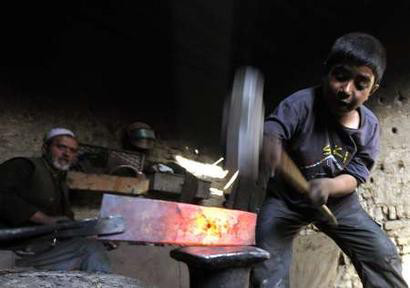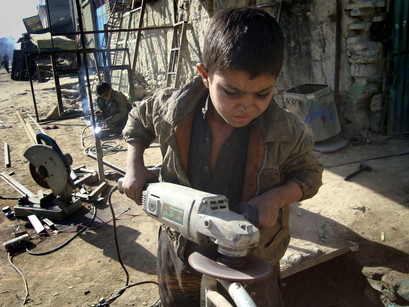By Michelle Nichols
Afghan Abdul Wahab swings a heavy sledgehammer down onto a red hot piece of metal to mold it into a truck part, sweat dripping down a face marked with grime and soot from the fire, and with a focus rare for an 11-year-old.

Afghan boy Abdul Wahab works in a blacksmith's shop in Kabul December 14, 2010. (Photo: Reuters/Omar Sobhani)
Wahab is one of about 1.2 million Afghan children in part or full time work, the government says, in a country where war, poverty, widespread unemployment and a preference for large families have created a huge underage labor market.
A 2010 study by the Afghanistan Independent Human Rights Commission found that an even larger portion of the country's 15 million children -- up to 40 percent -- were likely to be engaged in some sort of paid work. And aid and rights groups say child labor laws are routinely flouted.
While Afghan children can legally work up to 35 hours a week from the age of 14, they are not allowed to do hazardous jobs like Wahab's work in his father's Kabul blacksmith shop.
"I would like to go to school, but my father's alone here so I must help him," said Wahab, whose shoulders appear broad for his age because of the physical blacksmith work.
"My father can't feed us alone because the food in the market is very expensive ... we don't receive any assistance from the government."
His father, Abdul Rosaq, said he moved his wife and four children to Kabul two years ago from the western city of Herat.
"We have to work. I don't like my son working here. I want him to go to school, but we have to work," said Rosaq, who earns about 1,500 Afghanis ($33) a week in Kabul's Parwan 3 neighborhood, a hub of mechanics workshops.
After 30 years of conflict, Afghanistan is one of the poorest countries in the world, where children make up half the population, a quarter of children die before the age of five and the average Afghan life expectancy is 44 years.
Some children work for mechanics, in agriculture, weaving carpets, selling goods on the street, begging for money wiping down dusty vehicles stuck in Kabul's chronic traffic jams, or collecting cans and bottles from the city's putrid rubbish dump.
CHILD BREADWINNERS
The average annual income for an Afghan is $370 a year, according to The World Bank, and many families have to choose between giving children an education or sending them out to work.

Mohammad Gul, an eight-year-old Afghan boy, works in a welding shop in Khost, Dec. 11, 2010. Thousands of Afghan children works to help in supporting their families in Afghanistan. (Photo: AP/Nishanuddin Khan)
"A majority of them start to work from age nine and we have kids below nine selling things on the street," said Afghanistan Independent Human Rights Commissioner Nader Nadery. "A major portion of these kids ... are breadwinners for their families."
He said working children did not shock Afghans anymore, but it was a key rights and social problem and the government lacked a plan and resources to deal with it. The commission says that at least 1.5 million children are breadwinners for their families.
"If it's not dealt with, if they are left without education, then we are not only prolonging the conflict and providing more recruitees for it, but also we undermine any possibility of growth and the future development of the country," said Nadery.
Wearing a dirty red dress and green pants, Bebe Gul, 10, carries a white hessian bag to collect scrap metal. Her father was killed during an industrial accident and she has to earn money for her mother and four siblings instead of going to school.
"I do this for money, I sell it because my father was killed," Gul said, wiping her nose on her faded black headscarf.
Although Afghanistan signed the U.N. Convention on the Rights of the Child in 1994, UNICEF -- the world body's children's fund -- last month called for a comprehensive Child Act to fully protect the country's children.
Deputy Minister for Social Affairs Wasil Noor Muhmand said the government has a Child Protection Action Network, a joint initiative with aid groups, operated in 28 or the 34 provinces, covering a third of an estimated 6.5 million at risk children.
DESPERATE FAMILIES AMID CONFLICT
Muhmand said that decades of war in Afghanistan had left many children without fathers, making them responsible for supporting their family and that as a result the country had to let teenagers work, but not in hazardous jobs.

A girl carries rubbish on her head for recycling outside Kabul December 15, 2010. (Photo: Reuters/Omar Sobhani)
"The people of Afghanistan are responsible to implement the law," Muhmand said. "For the future of the children we want them to go to school, not to work, this is the responsibility of the government, this is the responsibility of the parents."
Flexible schooling to cater for working children was one way of making sure some children did not miss out on an education and programs that offered vocational training as well as traditional subjects, said a spokesman for Save The Children.
"Many children go to school ... they actually learn to read and write, but there's no job for them, there's no more job for them than if they couldn't read or write," said the spokesman.
He said that while it was entrenched in Afghan culture and religion that children should be in school, it had become socially acceptable to send children out to work because families had become so desperate.
Seven-year-old Ares is missing his two front teeth and wearing hooded overalls that are too small for him and have a tear in the bottom. He would like to be a teacher when he grows up, but for the past two years he has worked for a mechanic.
"Generally I'm working repairing the cars," he said shyly, sitting on top of the new frame of a truck, holding a spanner.
He goes to school from 6 a.m. to 9 a.m. and then works at least eight hours -- earning 50 Afghani ($1) a week -- wearing a silver religious pendant around his neck to keep him safe.
"I like school," said Ares, who has a sister and three brothers. "And I like to work here to have a good future."
(Additional reporting by Hamid Sayedi, editing by Sanjeev Miglani)
Published on Dec. 18, 2010



